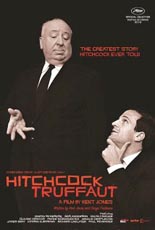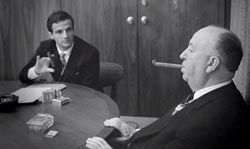
 However one pulls off a successful documentary about the making of a book, Kent Jones has done it with Hitchcock/Truffaut. Borrowing its title from the now-seminal film text published in 1966, the feature chronicles the unprecedented week of interviews between the two filmmaking giants (and their unheralded interpreter) and examines the volume’s unprecedented decades of influence ever since.
However one pulls off a successful documentary about the making of a book, Kent Jones has done it with Hitchcock/Truffaut. Borrowing its title from the now-seminal film text published in 1966, the feature chronicles the unprecedented week of interviews between the two filmmaking giants (and their unheralded interpreter) and examines the volume’s unprecedented decades of influence ever since.
On one side of the table, we have Alfred Hitchcock, the undisputed “master of suspense” and arguably regarded today as cinema’s greatest director — thanks in part to the man at the other side of the table: Francois Truffaut. The French New Wave pioneer questions Hitch at great length about each of his pictures, which, of course, comes to extend to the broadest scope of cinema as a whole. At the time, Hitch had only a few films left in him, whereas Truffaut was just getting started; while at different points in their respective careers, they found equilibrium in their love of the movies, which Jones renders infectious.
 Although film cameras ironically were not present for the men’s talks, an audio recorder was; Jones lucks into having their actual voices at his show-don’t-tell disposal, along with a smattering of behind-the-scenes photographs. Without these, the doc would lose what makes it special. He doesn’t rely solely on his subjects, either, opening the floor to such celebrity admirers as Martin Scorsese, David Fincher and Wes Anderson, all avowed fans of the classic book, which has inspired and informed work of their own.
Although film cameras ironically were not present for the men’s talks, an audio recorder was; Jones lucks into having their actual voices at his show-don’t-tell disposal, along with a smattering of behind-the-scenes photographs. Without these, the doc would lose what makes it special. He doesn’t rely solely on his subjects, either, opening the floor to such celebrity admirers as Martin Scorsese, David Fincher and Wes Anderson, all avowed fans of the classic book, which has inspired and informed work of their own.
The middle stretch of Hitchcock/Truffaut ceases to be about the book per se and becomes about Hitchcock’s films and his style. That’s not a knock against the doc, as such exploration is on-topic. Naturally, a wealth of clips is employed — with a heavy emphasis on 1958’s Vertigo — so the audience can see exactly the points being discussed; the result is like a crash course in Introduction to Film Theory. (Hitch’s stated position on an “erect” James Stewart as Kim Novak emerges from the closet is priceless.)
All of these tools grant Hitchcock/Truffaut a significant coat of polish; the film exhibits more flair than the Hollywood documentary for which Jones (an ace critic for Film Comment and elsewhere) heretofore was best known: 2007’s Scorsese-produced and -narrated Val Lewton: The Man in the Shadows. That said, there is something Hitchcock/Truffaut’s construction that gives it the feel of being made for cable or a Blu-ray box set vs. the big screen; however, that does not make the hour and a half any less absorbing or delicious. —Rod Lott
